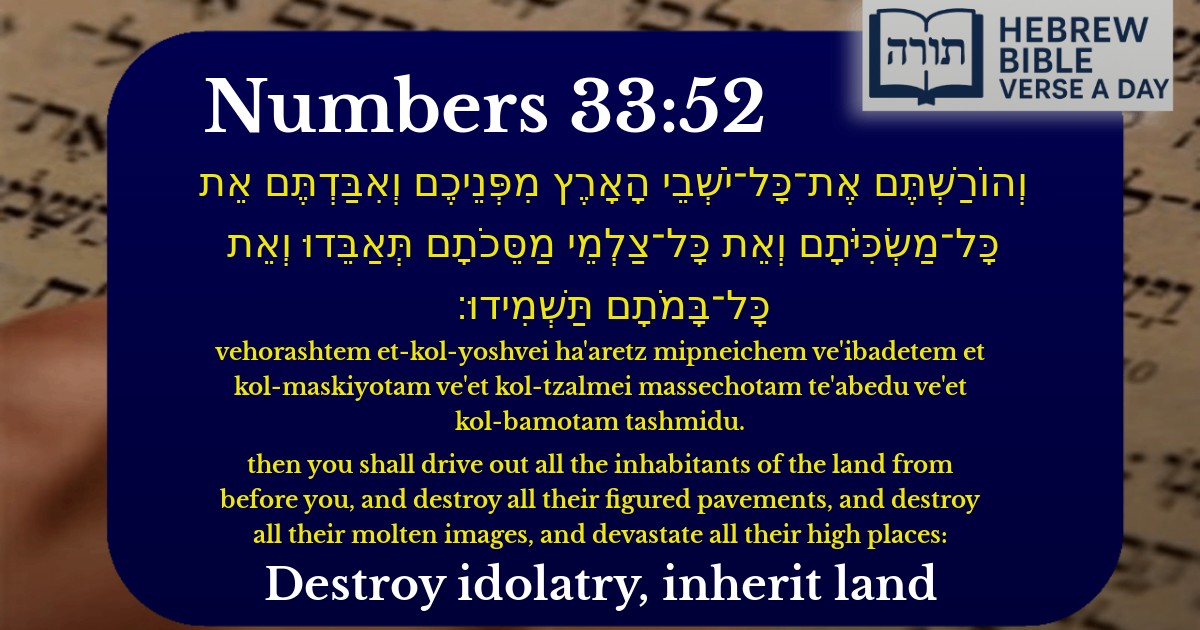Join Our Newsletter To Be Informed When New Videos Are Posted
Join the thousands of fellow Studends who rely on our videos to learn how to read the bible in Hebrew for free!
Hebrew Text
וְהוֹרַשְׁתֶּם אֶת־כָּל־יֹשְׁבֵי הָאָרֶץ מִפְּנֵיכֶם וְאִבַּדְתֶּם אֵת כָּל־מַשְׂכִּיֹּתָם וְאֵת כָּל־צַלְמֵי מַסֵּכֹתָם תְּאַבֵּדוּ וְאֵת כָּל־בָּמֹתָם תַּשְׁמִידוּ׃
English Translation
then you shall drive out all the inhabitants of the land from before you, and destroy all their figured pavements, and destroy all their molten images, and devastate all their high places:
Transliteration
Vehorashtem et-kol-yoshvei ha'aretz mipneichem ve'ibadetem et kol-maskiyotam ve'et kol-tzalmei massechotam te'abedu ve'et kol-bamotam tashmidu.
Hebrew Leining Text
וְה֨וֹרַשְׁתֶּ֜ם אֶת־כׇּל־יֹשְׁבֵ֤י הָאָ֙רֶץ֙ מִפְּנֵיכֶ֔ם וְאִ֨בַּדְתֶּ֔ם אֵ֖ת כׇּל־מַשְׂכִּיֹּתָ֑ם וְאֵ֨ת כׇּל־צַלְמֵ֤י מַסֵּֽכֹתָם֙ תְּאַבֵּ֔דוּ וְאֵ֥ת כׇּל־בָּמוֹתָ֖ם תַּשְׁמִֽידוּ׃
Parasha Commentary
📚 Talmud Citations
This verse is not quoted in the Talmud.


Overview of the Verse
The verse (Bamidbar 33:52) commands Bnei Yisrael to drive out the inhabitants of Eretz Canaan upon entering the land and to destroy all forms of idolatry, including their figured pavements (maseichotam), molten images (tzalmei masseichotam), and high places (bamotam). This mitzvah is foundational to establishing a Torah society in the Land of Israel.
Rashi's Explanation
Rashi (Rabbi Shlomo Yitzchaki) explains that "maseichotam" refers to images engraved on stones or walls, while "tzalmei masseichotam" are molten idols cast from metal. The "bamotam" are the altars used for idolatrous worship. Rashi emphasizes that the destruction of these items is necessary to eradicate any influence of avodah zarah (foreign worship) from the land.
Rambam's Perspective
Rambam (Maimonides) in Mishneh Torah (Hilchot Avodah Zarah 7:1-2) elaborates that this mitzvah is part of the broader obligation to eliminate idolatry entirely. He notes that even if the idols are not actively worshipped, their presence poses a spiritual danger. The destruction must be thorough—leaving no remnants that could lead future generations astray.
Midrashic Insights
The Midrash (Bamidbar Rabbah 19:3) connects this verse to the spiritual purity of Eretz Yisrael. It teaches that the land itself rejects idolatry and cannot tolerate its presence. Just as a body expels harmful substances, the land must be cleansed of spiritual impurities to fulfill its divine purpose as the dwelling place of the Shechinah.
Talmudic Discussion
The Talmud (Avodah Zarah 45b) discusses the practical application of this mitzvah, ruling that even aesthetically valuable idols must be destroyed if they were used for worship. However, if they were merely decorative, they may be permitted under certain conditions. This highlights the Torah's balance between uncompromising opposition to idolatry and pragmatic considerations.
Key Lessons